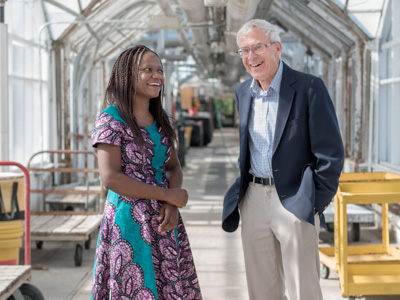
Some recent articles of horticultural interest:
The sweet gift of knowledge [periodiCALS 2017-11-28] – A gift in 2006 from professor emeritus Chris Wien created the Cornell Assistantship for Horticulture in Africa (CAHA), which provides a doctoral assistantship to one student from sub-Saharan Africa who completes coursework at Cornell but conducts dissertation research in the region. The position is contingent upon the student returning to his or her home country after their doctoral degree is complete. “Too often you see students get really involved in some fascinating project at Cornell and lose sight of the fact that they came from a country that could really use their help,” says Wien, who in the 1970s spent time working in Africa at the International Institute for Tropical Agriculture. That experience awakened him to the continent’s need for greater support in horticulture education.
Cornell program trains new farm owners for business success [CALS News/Cornell Chronicle 2017-12-12] – The Cornell Small Farms Program is preparing the next generation of farmers and ranchers to scale up their operations and reach key business milestones by preparing them to hire, manage and retain skilled employees, thanks to a USDA grant. “Our long-term goal is to ensure that all new farmers in our region can access high-quality information, supportive networks and proven tactics essential to starting and scaling viable farms,” said Anu Rangarajan, director of the Cornell Small Farms Program (CSFP) and senior extension associate in the Horticulture Section of the School of Integrative Plant Science
Northeast farmers weigh warm climate, drenched fields [CALS News/Cornell Chronicle 2017-12-13] – Farmers in the Northeast are adopting production habits tailored to longer, warming climate conditions, but they may face spring planting whiplash as they confront fields increasingly saturated with rain, according to a new Cornell-led paper in the journal Climatic Change, November 2017. Climate change in the Northeast could present two faces. “Climate change can easily intensify agricultural susceptibility, but also present fresh, surprising opportunities,” said David Wolfe, professor of plant and soil ecology and senior author of the paper. Earlier this fall, Wolfe also delivered the prestigious 2017 John MacLeod Lecture at the Royal Horticultural Society in London, where he detailed how gardeners can adapt to climate change as well as help mitigate its effects. View video.
Herbs From the Underground [New York Times 2017-12-06] – A hydroponic garden in a TriBeCa basement is growing rare herbs and edible flowers, and many prominent chefs are flocking to it. “People who find it weird to eat food grown in a basement have no reason to worry, said Neil Mattson, associate professor and greenhouse extension specialist at Cornell University. ‘There is nothing icky about it. Plants don’t care whether they get light from the sun or the lamps. It’s the same thing.’”
Honeynut Squash Is a Tiny Squash with a Big History [Bon Appétit 2017-11-30] – The fascinating story of how Cornell plant breeder Michael Mazourek created the shrunken butternut squash that’s increasingly popular in farmers’ markets and elsewhere. “Whether it’s farmers, chefs, or food enthusiasts talking about it, it’s clear that word of mouth is what boosted the popularity of the Honeynut. Two years ago, half the farms in the Northeast that grew squash had it, Mazourek revealed. ‘Now 90 percent of the farms grow it—you see it moving beyond regional to Cleveland going west and Virginia going south,’” he added.
Trees – the True Urban Warriors [Scientia 2017-12-12] – Trees benefit cities in many often-overlooked ways. They not only beautify concrete backdrops, but also improve the quality of our urban lives by providing shade, reducing storm runoff, filtering air and providing homes for birds and insects. Trees face big challenges, however, growing up in cities, largely because of drought and poor soils. To help trees survive these concrete deserts, Nina Bassuk and her colleagues at Cornell University have been evaluating trees and shrubs for their ability to adapt, including developing resilient hybrid oak trees. A parallel research track aims at remediating urban soil conditions to reduce urban tree stress.


